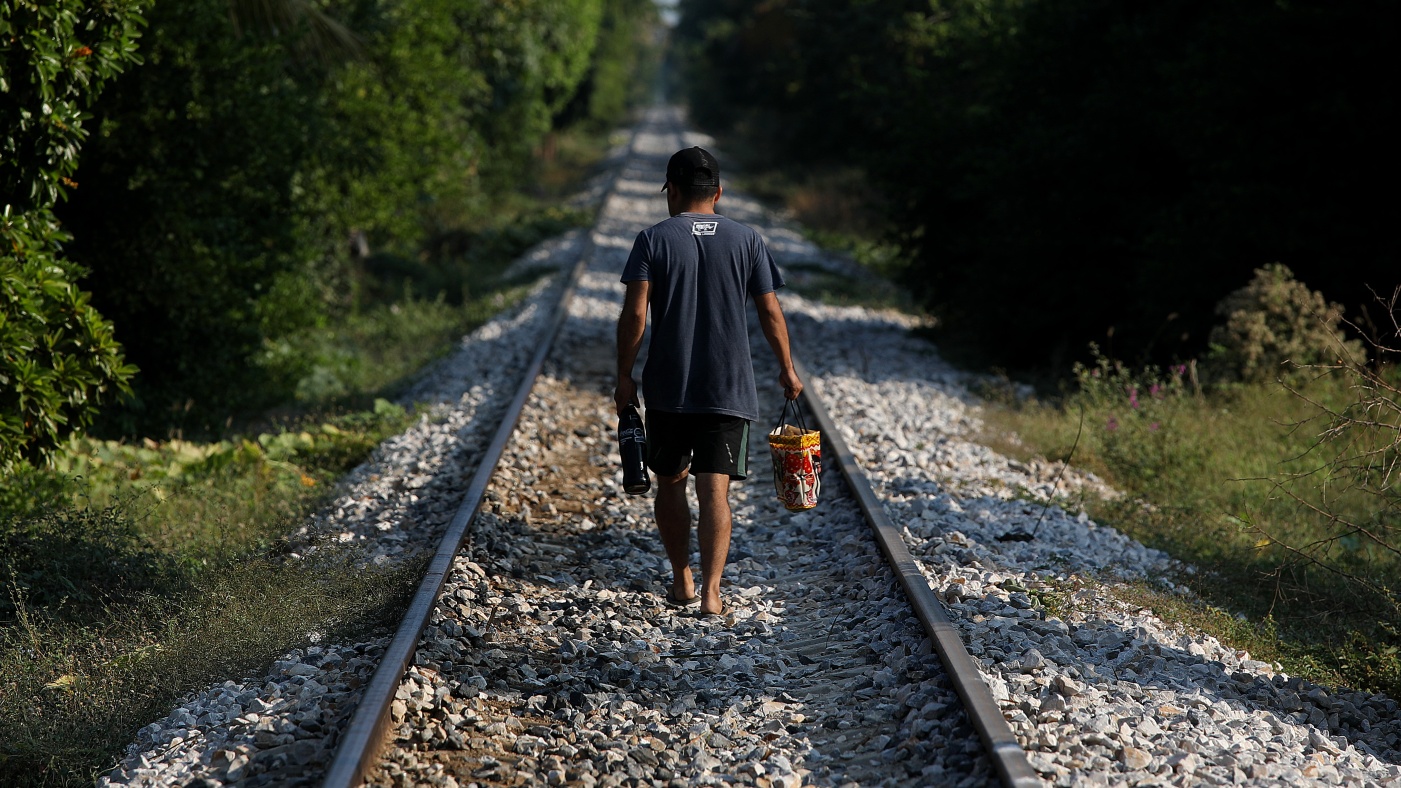The 100-year-old railway Mexico hopes will rival the Panama Canal
The route will run across Mexico's narrowest point, connecting the Gulf of Mexico and the Pacific Ocean

A free daily email with the biggest news stories of the day – and the best features from TheWeek.com
You are now subscribed
Your newsletter sign-up was successful
The Mexican government is reviving a century-old railway line between the Gulf of Mexico and the Pacific Ocean, in the hope that the route can one day rival the Panama Canal.
The restoration is part of a "bold bid to steal container traffic" away from the waterway, said the Financial Times.
The project "seeks to capitalise on multinationals' desire to be closer to the US" as well as the periods of low water levels in the Panama Canal as the region suffers "increasingly frequent droughts", said the paper.
The Week
Escape your echo chamber. Get the facts behind the news, plus analysis from multiple perspectives.

Sign up for The Week's Free Newsletters
From our morning news briefing to a weekly Good News Newsletter, get the best of The Week delivered directly to your inbox.
From our morning news briefing to a weekly Good News Newsletter, get the best of The Week delivered directly to your inbox.
Part of the development of The Tehuantepec Interoceanic Corridor (CIIT), a signature project of President Andres Manuel López Obrador, the interoceanic railway will run for 303km across Mexico's narrowest point, with the main line running between the port cities of Salina Cruz, Oaxaca, and Coatzacoalcos, Veracruz.
A new route for international freight
The revival of the railway line means that a ship could "unload its cargo from one side, send it by rail across the Isthmus, and reload it back onto another ship on the other side", thereby providing a new route through which international freight could flow, explained Mexico News Daily.
Originally part of the Tehuantepec line, the railway was first built for the government of dictator Porfirio Diaz and was inaugurated in 1907, before the Mexican Revolution and the opening of the Panama Canal "devastated business", said the FT.
The $2.8 billion project has been "buoyed" by Mexico's increasingly important trading relationship with the US; the country "surpassed China this year to become the US's top trading partner", said The Daily Upside. Given that America's relationship with China remains "decidedly frosty", Mexico can "feel secure in its new position for a while longer".
Droughts are also putting pressure on the canal. Last year the major shipping route, which relies on fresh water for its operation, faced its worst drought on record, causing significant delays.
A free daily email with the biggest news stories of the day – and the best features from TheWeek.com
Operators were forced to reduce the number of ships which passed through the canal from an average of 40 to 32 in order to save water, with each shipping vessel requiring some "200 million litres of freshwater to move through the canal's locks", said Euronews.
It is here that Mexico has spied its most significant opportunity; the government is "bullish" about the new rail route's prospects, as it will offer "proximity to the US and a transit time of 6.5 hours excluding loading time – less than the eight to 10 hours it takes on the 80km canal", said the FT.
Mexico's Secretary of Economy Raquel Buenrostro told the paper that Mexico's investment in railway infrastructure was "a real and increasingly important alternative", as the world faces increasing changes due to the climate crisis. In July, the minister said the trade corridor could account for as much as 5% of Mexico's GDP, reported Mexico News Daily.
A true alternative to Panama Canal?
There are doubts.
In a news conference the canal's director, Ricaurte Vásquez Morales, said: "Definitely the Mexican solution could be a potential threat to the Panamanian operation," but he added a replacement route would only be needed "if we were in a situation where there is no water at all, and we do not anticipate that".
Another major problem is the train route's capacity. Its maximum annual cargo capacity would be about 10.5% of the total amount of goods carried through the Panama Canal in 2022, according to calculations from the FT.
Sorcha Bradley is a writer at The Week and a regular on “The Week Unwrapped” podcast. She worked at The Week magazine for a year and a half before taking up her current role with the digital team, where she mostly covers UK current affairs and politics. Before joining The Week, Sorcha worked at slow-news start-up Tortoise Media. She has also written for Sky News, The Sunday Times, the London Evening Standard and Grazia magazine, among other publications. She has a master’s in newspaper journalism from City, University of London, where she specialised in political journalism.
-
 Political cartoons for February 15
Political cartoons for February 15Cartoons Sunday's political cartoons include political ventriloquism, Europe in the middle, and more
-
 The broken water companies failing England and Wales
The broken water companies failing England and WalesExplainer With rising bills, deteriorating river health and a lack of investment, regulators face an uphill battle to stabilise the industry
-
 A thrilling foodie city in northern Japan
A thrilling foodie city in northern JapanThe Week Recommends The food scene here is ‘unspoilt’ and ‘fun’
-
 Epstein files topple law CEO, roil UK government
Epstein files topple law CEO, roil UK governmentSpeed Read Peter Mandelson, Britain’s former ambassador to the US, is caught up in the scandal
-
 Mexico’s vape ban has led to a cartel-controlled black market
Mexico’s vape ban has led to a cartel-controlled black marketUnder the Radar Cartels have expanded their power over the sale of illicit tobacco
-
 Iran and US prepare to meet after skirmishes
Iran and US prepare to meet after skirmishesSpeed Read The incident comes amid heightened tensions in the Middle East
-
 Israel retrieves final hostage’s body from Gaza
Israel retrieves final hostage’s body from GazaSpeed Read The 24-year-old police officer was killed during the initial Hamas attack
-
 China’s Xi targets top general in growing purge
China’s Xi targets top general in growing purgeSpeed Read Zhang Youxia is being investigated over ‘grave violations’ of the law
-
 Panama and Canada are negotiating over a crucial copper mine
Panama and Canada are negotiating over a crucial copper mineIn the Spotlight Panama is set to make a final decision on the mine this summer
-
 Why Greenland’s natural resources are nearly impossible to mine
Why Greenland’s natural resources are nearly impossible to mineThe Explainer The country’s natural landscape makes the task extremely difficult
-
 Iran cuts internet as protests escalate
Iran cuts internet as protests escalateSpeed Reada Government buildings across the country have been set on fire